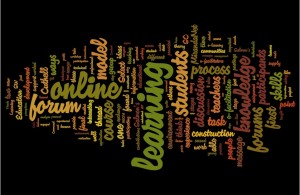Beyond Collaborative Learning
- Learning
- Beyond Collaborative Learning
- From practice to praxis
- ICT CPD Landscape Review
- ICT delusions: Plus Ça Change?
- Is teaching a technology, or is it more than that?
- Learning in Liminal Spaces
- Learning in Liminality
- MirandaMods
- Online forums as resources for teacher professional development
- A Learning Community
- The Role of Web-based Communities in Teacher Professional Development
- A City Learning Centre
The drive for e-learning as a cost-effective and flexible channel for distance and life-long learning has focused on the benefits of a just-in-time delivery of content to the learner. The assumption is that knowledge is inseparable from, and follows, content. An obvious and important aspect of e-learning has been the need for online tutors to deploy a range of Soft Skills to support learners. E-learning relies on e-tutoring: the concept of e-tutoring embodies mentoring, coaching and facilitating techniques. In an online environment in which student discussion forums constitute one of the tools for knowledge construction the role of the facilitator assumes greater importance that of mentor, moderator or coach. The ability to facilitate a discussion or a debate becomes central to the construction of new knowledge for the participants (Holmes et al, 2001) In spring and early summer 2004 a group of teachers from diverse backgrounds engaged in an intensive course in e-facilitation techniques. This paper describes how they learned and were taught, and evaluates the ways in which an online collaborative environment enabled the development of the basic skills required for e-facilitation. The paper then assesses the effectiveness of individuals as both contributors and e-facilitators in a range of online educational forums. It examines the contribution seach made, and details the e-facilitation techniques deployed in various forums. Outcomes are measured against the input that individuals made. The ways in which the participants were able to construct new knowledge in the online communal context are detailed. These are compared with some other models of learning in an online environment: Cuthell (2001); (Salmon (2002). Finally, the paper evaluates the ways in which e-facilitation enables individuals to construct new knowledge, both with and for others. An interesting consequence of participating in a course of this nature is that perceptions of teaching, learning and knowledge change. Do these perceptions follow through into the daily praxis of the teachers? The implications for teaching and learning in a range of educational environments are identified.
